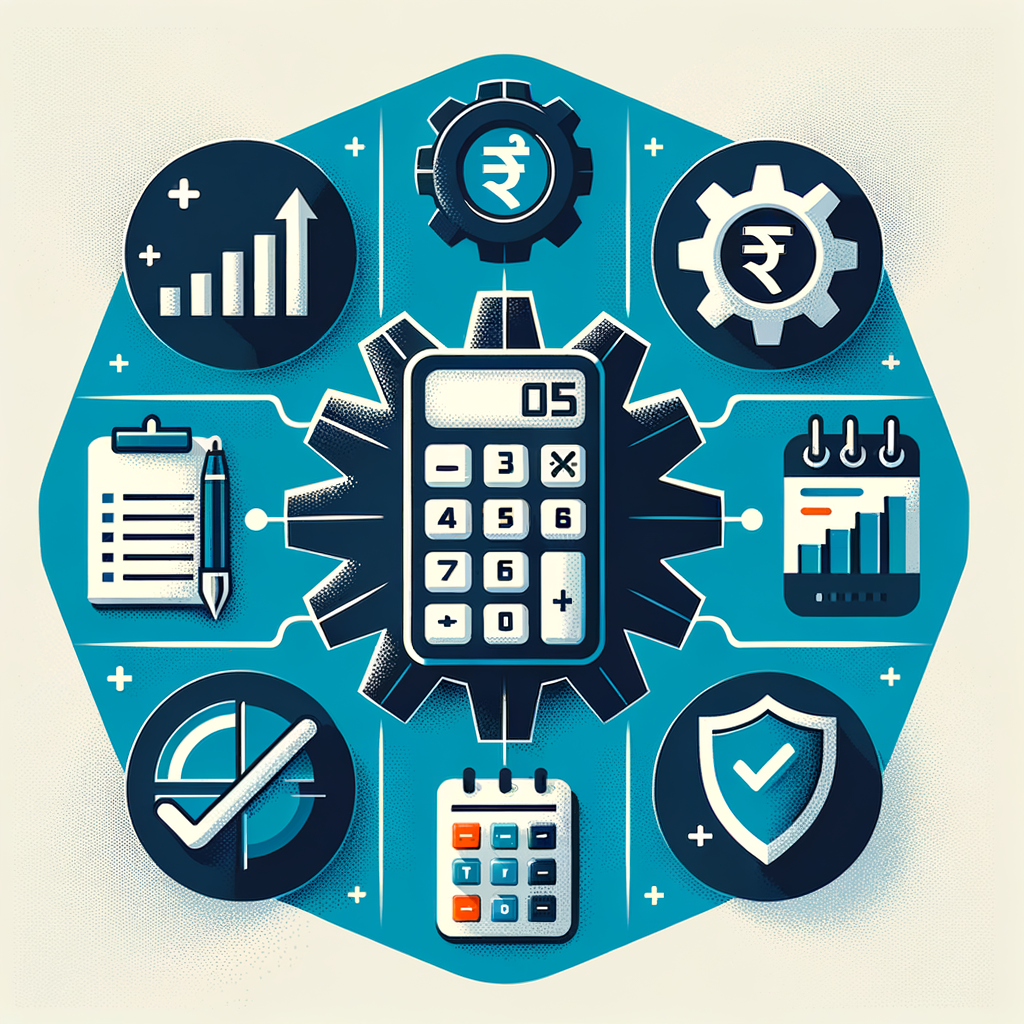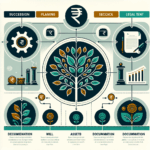Top Accounting Software for 2025: An In-Depth Accounting Software Comparison for Indian Businesses
Are you spending more time wrestling with spreadsheets and GST calculations than growing your business? If this sounds familiar, you’re not alone. For Indian small business owners, startups, and freelancers, manual bookkeeping is no longer a viable option in today’s fast-paced digital economy. In 2025, choosing the right accounting software is not a luxury but a fundamental necessity for efficient operations, flawless tax compliance, and smart, data-driven decision-making. This post provides a comprehensive accounting software comparison, breaking down the top options available in India to help you find the perfect fit for your specific business needs. We will cover everything from core features and mobile accessibility to pricing models and critical India-specific compliance tools, ensuring this guide is the only one you need whether you’re a small business owner, a startup founder, or even a salaried individual managing a side hustle.
Why Your Business Needs the Right Accounting Software in India
Relying on manual accounting methods in India’s dynamic tax landscape is like navigating a complex highway with an outdated map—it’s inefficient and fraught with risk. Manual ledgers and spreadsheets are highly susceptible to human error, which can lead to incorrect GST filings, missed tax deadlines, and potential penalties. Modern accounting software is designed to automate these complex processes, providing a foundation of accuracy and efficiency that allows you to focus on strategic growth rather than administrative burdens. The first step is to Set Up An Accounting System for My Small Business correctly, which this software will then power. By digitizing your finances, you unlock a new level of control and insight that is impossible to achieve with manual methods alone.
Master GST and Tax Compliance with Ease
The Indian Goods and Services Tax (GST) system, with its various components like CGST, SGST, and IGST, presents a significant compliance challenge for businesses of all sizes. The best online accounting solutions India are built with these complexities in mind. They automate the creation of GST-compliant invoices, ensuring the correct tax rates are applied every time. Furthermore, they streamline the entire compliance lifecycle by generating essential reports like GSTR-1 and GSTR-3B, and even annual returns, directly from your sales and purchase data. This makes it easier to follow a guide on How to File GST Returns Online: A Step-by-Step Guide of the GST Filing Process & Procedure. This drastically reduces the time and effort required for monthly and quarterly filings. The software also simplifies TDS management, automatically calculating deductions and helping you generate the necessary compliance reports, ensuring you stay on the right side of the law. For official guidelines and updates, always refer to the official GST Portal.
Gain Real-Time Financial Clarity
One of the most powerful benefits of dedicated accounting software is the ability to access up-to-the-minute financial reports. Instead of waiting for a month-end or quarter-end closing to understand your financial position, you can generate a Profit & Loss statement, Balance Sheet, or Cash Flow statement with a single click. This real-time visibility is a game-changer for strategic planning. It empowers you to identify trends, monitor profitability, manage cash flow effectively, and make informed decisions about inventory, pricing, and expansion. When you have a clear and current picture of your financial health, you can steer your business with confidence rather than guesswork.
Automate Tasks, Save Time, and Reduce Errors
The core value proposition of any good accounting software is automation. Mundane but critical tasks that consume countless hours when done manually are handled effortlessly by the system. This includes creating and sending professional invoices, setting up automated payment reminders to improve your cash flow, and tracking business expenses by simply scanning receipts with your phone. Perhaps the most significant time-saver is automated bank reconciliation, where the software connects to your bank account, imports transactions, and intelligently suggests matches to your recorded invoices and expenses. This automation not only frees up valuable time for you and your team but also minimizes the risk of human error, leading to more accurate and reliable financial records.
The Ultimate Accounting Software Features Review India for 2025
When you start evaluating different software options, the sheer number of features can be overwhelming. To help you cut through the noise, here is a checklist of the most critical features to look for. This accounting software features review India will serve as your guide to ensure you select a solution that meets both your current needs and future growth ambitions.
Core Accounting Essentials
These are the non-negotiable features that form the backbone of any accounting system.
- Invoicing and Billing: Look for software that allows you to create professional, customizable invoice templates. The ability to set up recurring invoices for regular clients is a huge time-saver for subscription-based or service businesses.
- Expense Management: Effective expense tracking is crucial for managing cash flow and maximizing tax deductions. Top solutions offer mobile apps for on-the-go receipt scanning and automatic categorization of expenses.
- Bank Reconciliation: A direct, secure bank feed that automatically imports transaction data is essential. The software should use smart algorithms to match these transactions with your recorded income and expenses, reducing manual reconciliation from hours to minutes.
India-Specific Compliance Features
Given India’s unique regulatory environment, these features are critical for any business operating in the country.
- GST Compliance: The software must be able to handle GST rate calculations, create GST-compliant invoices, and generate GSTR-1, GSTR-2A/2B reconciliation, and GSTR-3B reports seamlessly.
- E-invoicing and E-Way Bill Generation: With e-invoicing being mandatory for businesses with a turnover above a certain threshold, your software must have a built-in feature to generate and manage IRN-validated e-invoices directly. Similarly, integrated e-way bill generation is crucial for the movement of goods.
- TDS Calculation and Reporting: The system should automatically calculate Tax Deducted at Source (TDS) on relevant payments and help you prepare the necessary reports for filing TDS returns.
Scalability and Integrations
Your business will grow, and your software should be able to grow with it.
- Scalability: Consider whether the software can handle an increasing volume of transactions, add more users, and manage multiple business locations or entities under one account.
- Integrations: A great accounting solution doesn’t work in a silo. Check for pre-built integrations with popular Indian payment gateways (like Razorpay, PayU), CRM systems, and e-commerce platforms to create a unified business ecosystem.
Mobile Accessibility and Cloud Functionality
In an increasingly mobile world, the ability to manage your finances from anywhere is paramount.
- Cloud Functionality: Cloud-based software provides access to your data from any device with an internet connection, ensures your data is securely backed up, and facilitates easy collaboration with your accountant.
- Mobile App: A powerful mobile app is a must. It should allow you to send invoices, record expenses, check financial reports, and view your business dashboard on the go. This makes it one of the best accounting apps for accountants in India and business owners alike.
Reporting and Analytics
Good software doesn’t just record data; it helps you understand it.
- Standard Reports: Ensure the software provides all essential financial reports, including P&L, Balance Sheet, Cash Flow, Accounts Receivable, and Accounts Payable.
- Advanced Analytics: Look for customizable dashboards and in-depth analytical reports that offer business intelligence. These tools can help you track key performance indicators (KPIs), analyze sales trends by item or customer, and gain deeper insights into your business’s performance.
The 2025 Accounting Software Comparison: A Head-to-Head Review
Now, let’s dive into the core of our analysis. This section provides a head-to-head review of the top accounting software for businesses India has to offer in 2025. We’ll examine their strengths, weaknesses, and ideal use cases to help you make an informed choice.
Zoho Books
- Overview: Zoho Books is a powerful, comprehensive, and remarkably user-friendly cloud-based accounting solution from an Indian-origin global tech giant. It is designed as part of a larger ecosystem of business apps, offering seamless integration and end-to-end financial management. Its clean interface and deep feature set make it a top contender for modern businesses.
- Best For: Startups, small to medium-sized businesses (SMBs), and freelancers who need a scalable, all-in-one solution that excels in compliance and ease of use. For those just beginning, understanding the Starting a Startup in India: Legal and Tax Essentials is crucial.
- Key Features: End-to-end accounting from invoicing to reconciliation, exceptional GST handling with direct filing options, e-invoicing and e-way bill generation, multi-currency support, robust project and time tracking, a strong client portal for customer self-service, and one of the best mobile apps on the market.
- Pros & Cons:
- Pros: Extremely intuitive and easy to learn. Excellent value for money in its initial tiers. Deep GST compliance features are tailored perfectly for the Indian market. Seamless integration with other Zoho apps (CRM, Inventory, etc.) creates a unified platform.
- Cons: The cost can escalate as your business grows and you need to add more users or subscribe to more advanced modules from the Zoho ecosystem.
TallyPrime
- Overview: Tally is the undisputed veteran and long-standing industry standard for accounting in India. TallyPrime is its latest and most refined version, bringing a more modern interface and new features to its legendary robust platform. It is primarily a desktop application but offers connected services for remote access.
- Best For: Established medium-to-large businesses, manufacturing companies with complex inventory needs, and professional accountants (CAs) who require unparalleled depth and power.
- Key Features: Advanced inventory management (including batch and expiry tracking), sophisticated payroll processing, comprehensive GST and TDS compliance features, multi-company support, and strong offline capabilities. Its security and data integrity are considered top-tier.
- Pros & Cons:
- Pros: Extremely powerful and can handle virtually any complex accounting scenario. It is the software most accountants in India are trained on, which simplifies collaboration. Strong offline performance is a major plus in areas with unreliable internet.
- Cons: Has a steeper learning curve compared to its cloud-native competitors. The user interface, while improved in TallyPrime, can still feel less intuitive and modern. The pricing model involves a higher upfront cost.
QuickBooks India
- Overview: QuickBooks is a global leader in accounting software, and its Indian version is tailored to meet local compliance needs. It is renowned for its clean, intuitive user interface and strong focus on simplifying accounting for business owners who may not have a financial background.
- Best For: Service-based businesses, consultants, startups, and tech-savvy entrepreneurs who prioritize a beautiful user interface and seamless user experience.
- Key Features: Excellent invoicing and expense tracking capabilities with smart categorization. Highly insightful and customizable dashboards that provide a quick financial overview. Good integration capabilities with a wide range of third-party apps. Strong project profitability tracking features.
- Pros & Cons:
- Pros: The user interface is arguably the best in class—it’s clean, modern, and very easy to navigate. The mobile app is robust and highly functional. Great for gaining quick insights into business health.
- Cons: While it handles basic GST, its compliance features may not be as exhaustive or deeply integrated as those offered by Zoho Books or Tally, especially for businesses with complex manufacturing or trading operations.
Vyapar
- Overview: Vyapar is a simple, mobile-first accounting and inventory management application designed specifically for micro and small businesses in India. It prioritizes simplicity and affordability, focusing on core billing, inventory, and GST needs.
- Best For: Micro-businesses, small retailers, freelancers, and mobile-first entrepreneurs who need a straightforward and budget-friendly tool for GST billing and basic accounting.
- Key Features: Simple GST-compliant invoicing, basic inventory management, payment reminders sent directly via WhatsApp, and options for creating an online store. It is available on both mobile and desktop and is extremely affordable.
- Pros & Cons:
- Pros: Incredibly easy to use, even for those with no accounting knowledge. The pricing is very aggressive, making it accessible to the smallest of businesses. The WhatsApp payment reminder is a unique and useful feature for the Indian context.
- Cons: It is not a full-fledged accounting solution. It lacks advanced features like payroll, detailed financial reporting, multi-location management, or deep audit trails, making it unsuitable for growing or complex businesses.
At a Glance: Best Accounting Software 2025 India – Comparison Table
| Feature | Zoho Books | TallyPrime | QuickBooks India | Vyapar |
|---|---|---|---|---|
| Ideal User | Startups & SMBs | Medium & Large Businesses, CAs | Service-Based SMBs | Micro-businesses & Retailers |
| Platform | Cloud & Mobile | Desktop (with cloud access) | Cloud & Mobile | Mobile & Desktop |
| GST Compliance | Excellent | Excellent | Good | Good |
| E-invoicing | Yes | Yes | Yes | Yes |
| Ease of Use | Very High | Medium | High | Very High |
| Pricing Model | Subscription | One-Time + Annual Fee | Subscription | Subscription |
| Key Strength | All-in-One Ecosystem | Power & Depth | User Interface | Simplicity & Affordability |
Final Verdict: An Accounting Software Review 2025 India Summary
Choosing the “best” accounting software is a subjective decision that ultimately hinges on your unique business needs. There is no one-size-fits-all answer. The key takeaway from this accounting software comparison is to match the software’s strengths to your business’s size, industry, budget, and future goals. To summarize: choose Zoho Books for its incredible ease of use, scalability, and all-in-one ecosystem. Opt for TallyPrime if you need raw power, deep inventory features, and are in a more traditional industry where CA collaboration is key. Select QuickBooks India if you prioritize a beautiful user interface and are primarily a service-based business. Finally, go with Vyapar if you are just starting out and need a simple, affordable solution for basic billing and GST.
Feeling uncertain about which software to choose or how to implement it? The experts at TaxRobo can provide a personalized consultation to assess your needs, recommend the right software, and even manage your entire accounting and tax filing process for you. Contact TaxRobo today for a free consultation and take the guesswork out of your finances!
Frequently Asked Questions (FAQs)
1. Is free accounting software sufficient for a small business in India?
While free plans offered by some providers are a great way to start, they are typically very limited. They might cover basic invoicing but often lack crucial features like comprehensive GST return filing, bank reconciliation, detailed financial reporting, and multi-user access. As your business processes invoices and grows, you will quickly find these limitations restrictive and will need to upgrade to a paid plan to maintain compliance and efficiency.
2. How difficult is it to switch from one accounting software to another?
Most modern online accounting solutions India provide tools to help you migrate. This usually involves exporting your data—such as customer lists, vendor lists, and chart of accounts—from your old system and importing it into the new one using CSV files. However, migrating historical transaction data can be complex and requires careful mapping to prevent errors. To ensure a smooth transition without any data loss or compliance gaps, it is highly recommended to consult with a professional, like the team at TaxRobo’s Accounts Service, who can manage the entire process for you.
3. Should I choose a desktop or a cloud-based accounting software?
For most businesses in 2025, cloud-based software is the clear winner and modern standard. Its primary advantages are accessibility from any device anywhere, real-time data for you and your team, automatic and secure data backups, and seamless collaboration with your accountant. Desktop software like TallyPrime still holds its ground due to its robust offline capabilities, which can be a critical advantage in areas with inconsistent internet connectivity. However, for flexibility and modern features, cloud-based is the recommended choice.
4. How exactly does this software help me with my GST filings?
Accounting software automates the most tedious parts of GST compliance. When you create an invoice or record a purchase, the software automatically categorizes the transaction under the correct GST slab (5%, 12%, 18%, 28%) based on the item or service. At the end of the month or quarter, it uses this meticulously recorded data to auto-populate your GSTR-1 (outward supplies/sales) report. It also helps you reconcile your purchase data with GSTR-2A/2B to claim accurate Input Tax Credit (ITC) for your GSTR-3B filing. This significantly reduces manual data entry, minimizes calculation errors, and simplifies the entire filing process.



